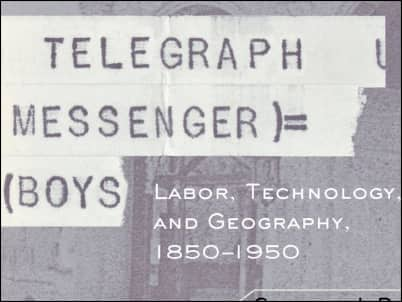Page 1 of 11
If an arbitration agreement isn’t accessible, is it still valid?
If a blind customer has to rely on employees to tell them about a mandatory arbitration agreement—and there’s no evidence an employee ever does so—is that still binding?
September 2018 / 3 min.
Week 5 of my first online course
Teaching an online course is like taking an online course.
February 2018 / 2 min.
Teaching my first online course
Spring of 2018 will be the first time I’ve taught a course completely online.
January 2018 / 1 min.
Welcome to Hugo
After careful consideration, I have moved my long-running blog away from WordPress and instead I now build it statically with Hugo.
January 2018 / 2 min.
The telegraph and the domestic home
 “American District Telegraph Company was originally conceptualized as a business service, but it quickly began to sell itself as a service for the home as well.”
“American District Telegraph Company was originally conceptualized as a business service, but it quickly began to sell itself as a service for the home as well.”
October 2017 / 2 min.
Justice Scalia on the Constitution, privacy, and criminality
 Justice Scalia once noted that “the Constitution sometimes insulates the criminality of a few in order to protect the privacy of us all.”
Justice Scalia once noted that “the Constitution sometimes insulates the criminality of a few in order to protect the privacy of us all.”
April 2016 / 1 min.
Four useful analytic categories from science and technology studies
 Science and technology studies (STS) is an interdisciplinary collection of analytic approaches. In his analysis of the Digital Millennium Copyright Act, Philip Doty pulls out four concepts from STS that he believes are particularly useful
Science and technology studies (STS) is an interdisciplinary collection of analytic approaches. In his analysis of the Digital Millennium Copyright Act, Philip Doty pulls out four concepts from STS that he believes are particularly useful
February 2016 / 2 min.
The “third-party problem”: one reason telegrams were not constitutionally protected
 Unlike postal mail or, later, the telephone, telegrams never received constitutional protection. Yet they were the quintessential nineteenth-century technology of communication, used extensively for business, government, and personal communication, much of which both senders and receivers would have wished to keep to themselves.
Unlike postal mail or, later, the telephone, telegrams never received constitutional protection. Yet they were the quintessential nineteenth-century technology of communication, used extensively for business, government, and personal communication, much of which both senders and receivers would have wished to keep to themselves.
January 2014 / 2 min.
Musings on law, technology, and privacy
 I’ve been working on my dissertation for a few months now (it looks at American privacy law over some 150 years, and investigates how technology interacts with that law). Some of that work will emerge here in draft form eventually, but for now I’ve been thinking about the theoretical/critical framework for my work. Much of this framework will be implicit – since I’m writing a dissertation in history – but it will guide me nonetheless. It will develop throughout the writing process, but here are some initial thoughts.
I’ve been working on my dissertation for a few months now (it looks at American privacy law over some 150 years, and investigates how technology interacts with that law). Some of that work will emerge here in draft form eventually, but for now I’ve been thinking about the theoretical/critical framework for my work. Much of this framework will be implicit – since I’m writing a dissertation in history – but it will guide me nonetheless. It will develop throughout the writing process, but here are some initial thoughts.
December 2013 / 3 min.
NSA spying is not clearly unconstitutional
 I’ve been noticing a trend to call the activities of the NSA – as revealed by Edward Snowden – “clearly unconstitutional.” I disagree.
I’ve been noticing a trend to call the activities of the NSA – as revealed by Edward Snowden – “clearly unconstitutional.” I disagree.
August 2013 / 4 min.